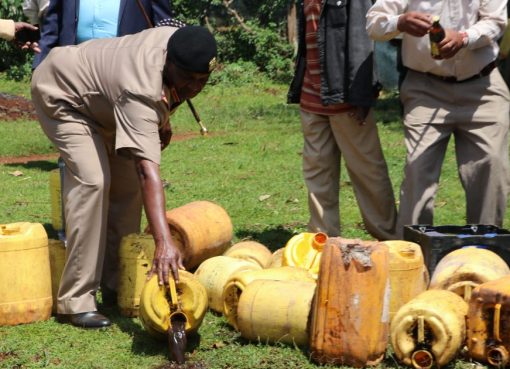Children are early adopters of Information Communication Technologies (ICTs), yet they are the most vulnerable consumers.
Communications Authority of Kenya (CA) Director General (DG) David Mugonyi has said online experience for children is threatened by online harm, a combination of cybercrime, privacy violations and abuse.
Speaking during a session on “Internet hygiene: Children Privacy Online at the Network of Africa Data Protection Authorities (NADPA) Conference, Mugonyi noted that creating a safe digital experience for our children is urgent and pressing.
Achieving this however, he said calls for a multi-sectoral ecosystem that eliminates vulnerabilities and minimizes as many threats as possible.
“Protecting children online is a complex, multidimensional and dynamic challenge and we need data protection, consumer protection, industry regulation, safeguarding and public education,” he said.
The DG mentioned that the International Telecommunications Union estimates that approximately 5.4 billion people, which is 67 percent of the global population were using the internet in 2023 and at the same time globally, almost 80 percent of children and youth between 15-24 years use the Internet, 13 percent more than the rest of the population.
In Africa, the DG explained that 53 percent of children and youth in the same age bracket use the internet, noting that privacy of children is thus essential for their safety particularly on social media platforms, where they may unintentionally disclose private data, images or videos which could result in cyberbullying and privacy violations.
For many of us being connected is a necessity. The internet has brought about enormous benefits over the years, Creativity, Productivity, Education and Social connection, it has also opened up opportunities for millions worldwide, from being able to find information and expressing ourselves to transforming the way we do business.
However, children online are possible targets of sexual exploitation and abuse such as, sexting, sextortion, online grooming and online solicitation,” he said naming other threats, which include cyber bullying, public shamming, cyber stalking, tolling, doxing, hate speech, intimidation and online threats, added Mugonyi.
Mugonyi therefore underscored the importance therefore for all service providers with websites or online services that children can access to take deliberate measures to protect the experience and privacy of children on their platforms.
“Kenya’s Data Protection Law restricts the collection of Data from children without parental consent, while the United Nations Convention on the Rights of the Child highlights the need to create special protections for children and back them in law,” he said
He gave an example of the United Kingdom (UK) which has blocked targeted and personalized advertising for children and accounts for anyone under 18 are automatically set to private and adults cannot message them.
He said that there will be need to develop and implement technical and operational measures to protect children online, which include deliberate interventions that encourage the design of products and services that acknowledge the rights of children with mechanisms such as privacy by design and safety by design.
“To complete the ecosystem, it is important to have clear procedures for handling child online protection related complaints and incidents. Countries like Australia have done so,” noted Mugonyi.
He explained that through an elaborate Child Online Protection (COP) programme that CA rolled out in 2015, the organization has been providing both children and their parents with the knowledge to keep them safe, so as to minimize and eliminate exposure to risks and vulnerabilities.
“We have not only sensitized teachers, but have also leveraged impactful events such as music and drama festivals to create awareness among students across various levels of learning. We are escalating child online safety sensitization across all spheres of our society”, Mugonyi said.
The Authority, he added, is further scaling up the conversation to devolved administrative units, where they provide avenues for communities to interact with various actors in this space to discuss effective ways of ensuring children productively use the Internet and the role of the wider society in this.
During his remarks, Information, Communications and the Digital Economy CS Eliud Owalo said computers have brought untold benefits to children around the world as the number of connected households increase by day.
However, Owalo noted that as Children and young adults engage more with the digital world, there was a need to explore what mechanisms exist to protect children online.
The CS called upon NADPA members to promote child safety by ensuring the right frameworks are put in place to protect children and also to prepare them for the digital opportunities.
On her part, Chief Justice Martha Koome said that in this digital age, it has increasingly become evident that children and young adults are not just passive consumers of technology, but active participants in the digital world.
“From online learning to social media interactions, children engagement with digital platforms is pervasive and profound, but the same digital landscape is fraught with potential risks, ranging from exposure to inappropriate content to online harassment and exploitation.
As African countries, Koome said we must urgently prioritize the protection of children online, recognizing that their safety and wellbeing are paramount.
She added that emerging issues such as internet hygiene, cyberbullying and online predators, underscore the need for comprehensive mechanisms to safeguard children’s digital experiences, thus it was important that digital policies and programmes take into account unique vulnerabilities of children and prioritize their safety in the design of software applications and online platforms
“I want to urge you as Africa’s Data Protection Authorities to prioritize the protection of children’s data, recognizing that their safety and well-being are paramount,” said Koome.
The CJ added, “By building a safe and trusted digital space for children, we can empower them to harness the potential benefits of technology, while mitigating the inherent risks, ensuring that they can explore, learn and grow in a secure online environment.
According to Section 33 of the Data Protection Act in Kenya, every data controller or data processor shall not process personal data relating to a child, unless consent is given by the child’s parent or guardian and that the processing is in such a manner that protects and advances the rights and best interests of the child.
By Wangari Ndirangu





